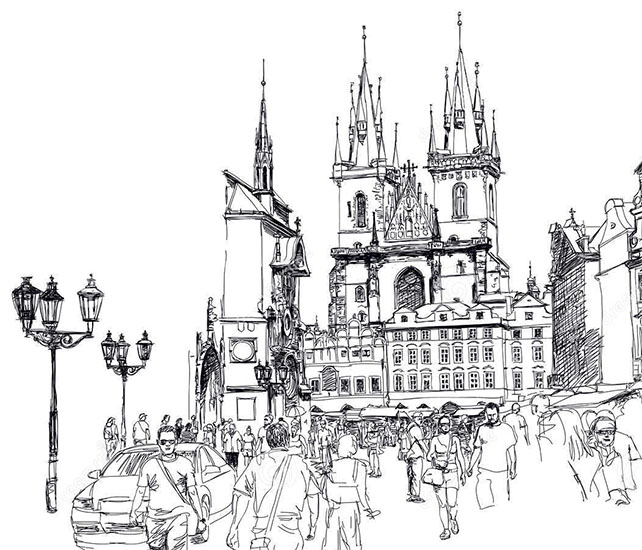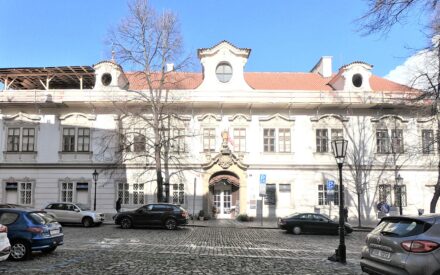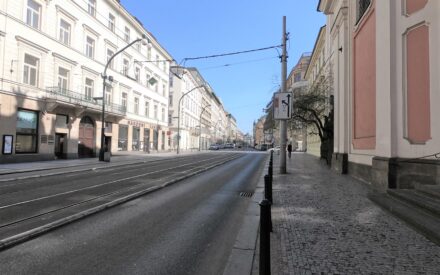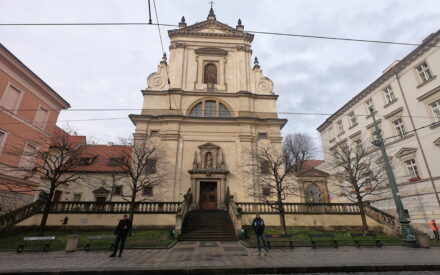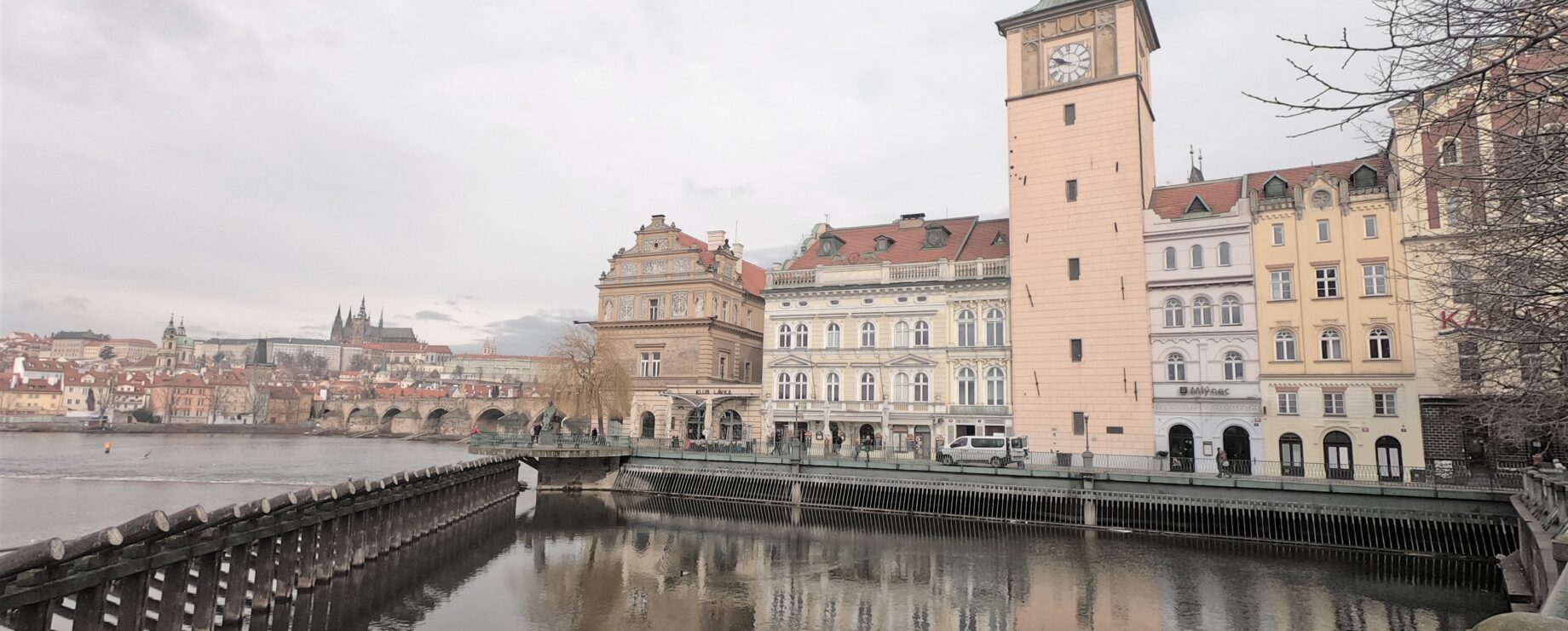
Novotného lávka
If one goes further along the embankment, one will arrive at Novotného lávka (Novotný-Steg or Novotný‘s Footbridge) where the next part of Description of a Struggle.
Is played out: And I did not excuse my acquaintance – we were just taking our first steps towards Františkovo nábřeží – not one jot of the shame that he must have felt over those words. Only then did my thoughts turn from one to the next, because the Vltava and the quarter on the other bank lies in the same darkness. There were a couple of lights that shone there and played with our eyes.
We crossed the railway tracks to the handrail above the river, where we stopped. I found a tree to lean on. Because of the cold that I felt rising from the water, I put on my gloves, sighed like a person standing in the night above the river, nevertheless I then wanted to continue on my way. But my acquaintance looked into the water and did not budge. He then stepped closer to the railing, his legs touching the iron, he leaned on his elbows and covered his forehead with his palm. What else? I’m freezing, I had to pull up my collar. My acquaintance stretched his back, shoulders, neck and the upper part of his body, leaning on his taut arms over the railing. (…)
When I was still searching for some means, in order to stay a while longer with my acquaintance, it occurred to me that he might feel uncomfortable next to a tall figure who made him seem small. And this eventuality was troubling me – it was late at night and we had hardly met anyone – so I stooped forward so that my hands were touching my knees while I was walking. However, in order that my acquaintance would not notice my intention, I changed my poise quite slowly, diverting his attention from myself in every possible way, once I even turned towards the river and pointed out with arms outstretched the trees on Shooting Island (Střelecký ostrov), and how the lamps on the bridge were reflected in the river.
But he turned round swiftly, looked at me – I was not yet quite ready – and said: “Listen, what is that? After all you are completely cockeyed! What are you up to here?”
“Quite correct,” I said with my head at the level of the seam of his trousers, so I could not look up properly. “You have such sharp eyesight!”
“Come on, get up! Such foolishness!”
“Not likely,“ I said, staring at the nearby ground, “I’ll stay where I am.”
“Let me tell you something, you can make a person get quite angry. Such an unnecessary delay. So, just stop it!”
“You are shouting! On such a peaceful night!” I said. “Anyway, as you wish,” he added, and after a moment: “It‘ s a quarter to one.” He probably read the time from the clock on the mill tower.
Immediately I straightened up, as though he had pulled me up by the hair. I remained for a moment with mouth wide open so that the anger had time to subside. I realised he was sending me away. There is apparently no place for me near him and if there were to be some after all, it is not even to be found. And, by the way, why on earth should I remain with him in any case. No, no, I ought to go – immediately – to my relatives and friends who are waiting for me. But if I have no relatives and friends, I have to take care of myself (what use is lamentation!), I don’t have to disappear any less quickly just because of this. Since there is nothing around him that can help me, neither my height, nor my appetite, not even my cold hand. Although should I have this idea that I must remain with him, then it is a dangerous idea.
“I did not need you to let me know,” said I, which was true.
“Thank God you’re finally standing up straight. After all, I only said it was a quarter to one.”
“Fine, fine,” I said and pushed two fingernails into the gaps between my numb teeth. “If I don’t have any need for you to tell me anything, I need even less explanation. I don’t need anything other than your compassion. Please, please, take back what you just said!”
“That it’s a quarter to one? But with the greatest of pleasure as it is long past quarter to.”
He raised his right arm, jerked his hand and listened to the castanet sounds of his cufflinks.
Now, by all indications, it appears that a murder is going to be committed. I stand by him as he pulls a knife, clasping its handle in his pocket, drawing it upward along the side of his mackintosh, and then pointing it at me. It is highly unlikely that he will wonder quite how easy the whole thing is, but who knows. I will not cry out, I will only look at him, for as long as my eyes can hold his gaze.
“Well then?” he said.
A policeman flew out from a distant coffee house with darkened windows as if on skates along the pavement. The sabre got in his way, he grasped it into his hand, with a long slide he sped off and finally made an almost arched turnaround. Eventually he gave a weak chortle and with his head full of melodies he went on with his skating.
It was only this policeman who, at some two-hundred paces from the impending murder, saw and only heard himself, gave me some kind of fright. I realised that it looks as if it is definitely curtains for me, whether I let myself to be stabbed, or run away. Was it not better to escape and subject myself to a slower and more painful death? I had no reasons to hand for gaining advantage for this kind of death, though I could not spend the last moments which remained to me looking for reasons. There will be time for that later, until I make the decision, and I did come to the decision.
As far as the said “distant coffee house“ is concerned, if we stick to the text, it will most probably be the Café Bellevue, which was constructed in 1895 in the Dutch style (red bricks and yellow-framed windows). After the Velvet Revolution it re-opened under its old name as a wine bar and restaurant.
This guided walk is a part of the “Democracy on the Brink. Historical lessons from the late 1930s” project supported by the Europe for Citizens programme of the European Union.
Další místa na téma "A literary walk through Kafka’s Prague on the trail of his story Description of a Struggle"
